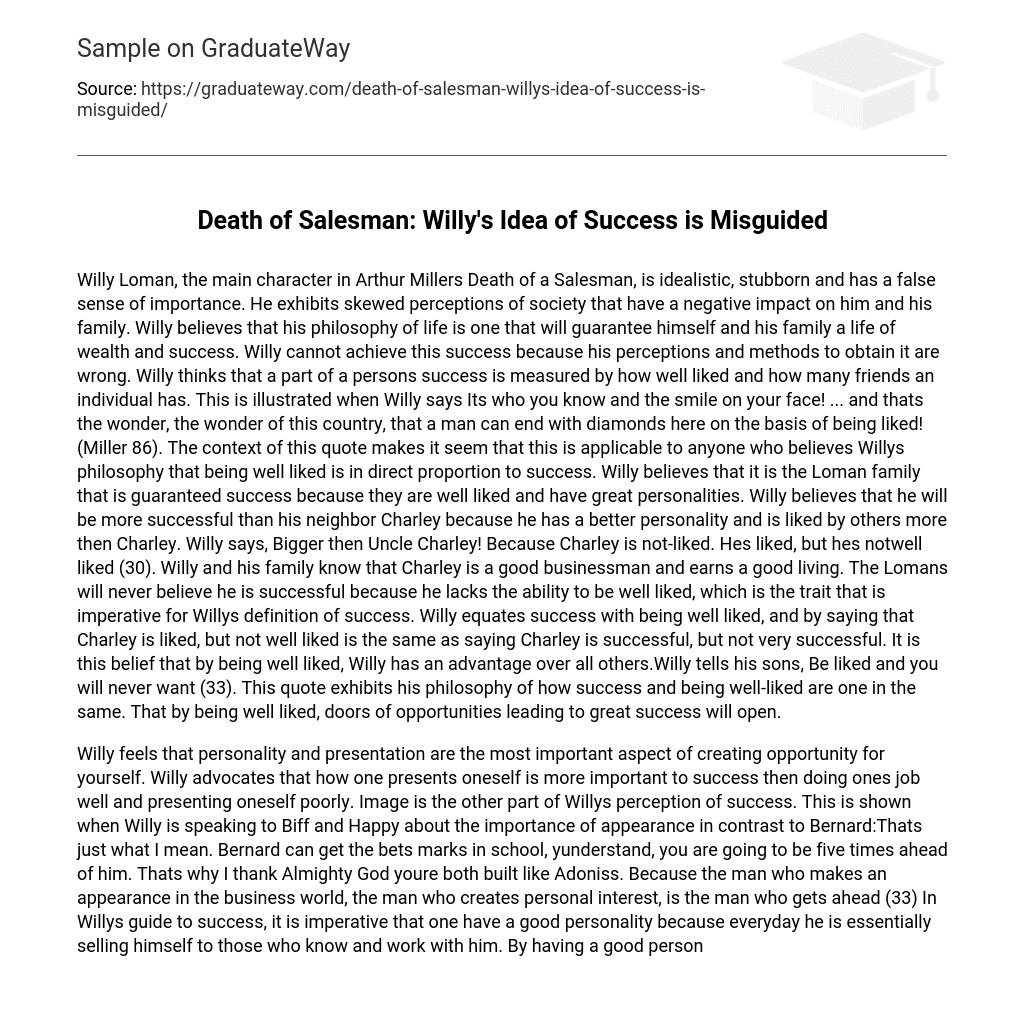The protagonist of Arthur Miller’s Death of a Salesman, Willy Loman, possesses idealistic and stubborn traits, along with a false sense of importance. His distorted views on society have a detrimental impact on himself and his family. Willy firmly believes that his personal philosophy will lead to wealth and success for himself and his loved ones. Unfortunately, his misguided perceptions and flawed methods prevent him from achieving such success. Willy mistakenly believes that one’s popularity and number of friends directly determine their level of success. A telling example is when Willy exclaims, “It’s who you know and the smile on your face!… that a man can end with diamonds here on the basis of being liked!” (Miller 86). This quote suggests that anyone subscribing to Willy’s philosophy would see being well-liked as crucial for attaining success. Moreover, Willy believes that his family, the Lomans, are destined for success due to their likable personalities. He convinces himself that he will surpass his neighbor Charley in terms of success because of his superior personality and greater likability. In Willy’s words, “Bigger than Uncle Charley! Because Charley is not-liked. He’s liked, but he’s not well-liked” (30). Despite knowing that Charley is a reputable businessman who earns a comfortable living, Willy’s emphasis lies solely on being well-liked rather than professional competence.The Lomans are unconvinced of his success because he lacks the ability to be well-liked, a trait essential in Willy’s understanding of success. Willy equates success with popularity, suggesting that Charley is successful but not highly successful due to his moderate likability. This belief serves as the foundation for Willy’s conviction that being well-liked gives him an advantage over others. Instructing his sons, Willy insists on the importance of being liked, assuring them that with popularity they will never lack anything. This quotation showcases Willy’s philosophy that success and popularity are intertwined. By being well-liked, doors to tremendous opportunities leading to great success will open up.
Willy believes that personality and presentation are crucial in creating opportunities for oneself. He argues that how one presents oneself holds greater importance to success than merely excelling at one’s job while presenting oneself poorly. Image plays a significant role in Willy’s perception of success. This is evident when he discusses the importance of appearance with Biff and Happy in contrast to Bernard. Willy believes that if one is well-liked, they will be more successful, regardless of their academic achievements. According to Willy, the key to success lies in having a good personality because every day one is essentially selling themselves to others. Willy asserts that personality always triumphs over what is said because those with good looks and personality will always stand out from the crowd and come out on top. Furthermore, Willy advocates for stealing and cheating as means to achieve success, suggesting that he and his family are exempt from the rules of modern society.Willy consistently encourages his children to engage in stealing and cheating, demonstrating a complete lack of remorse for these actions. In a proud manner, Willy boasts to his brother Ben about the quality of the stolen lumber that his children brought home recently, which holds significant value. He not only encourages stealing but also provides an alternative interpretation, showcasing it as a valuable skill. When Willy speaks to his son Biff about the football he stole from school, he justifies it by saying that Biff needs to practice with a regulation ball and suggests that the coach will praise Biff for his initiative. This reinforces Willy’s belief that stealing can facilitate a smoother path to success. Moreover, Willy advocates for cheating as well. When Biff fails the Regent tests and cannot graduate or attend college due to insufficient credits, Willy becomes infuriated. However, instead of blaming his own son, he shifts the blame to Bernard, insinuating that Bernard did not provide Biff with the answers. This incident serves as an example of how Willy supports cheating as a means to achieve success. With the same manipulative mindset, Willy applies these techniques in his work, attempting to ensure easier access to the buyers. The woman, who happens to be one of the buyers’ secretaries and is having an affair with Willy, promises to facilitate his entry into their presence whenever he visits their office.There is no longer any need for me to wait at my desk (116). In this scenario, Willy deceives his wife and the other salespeople by taking a shortcut to meet the buyers.
Willy Loman’s distorted view of success is a result of his ignorance and his refusal to acknowledge the truth and the realities of the world. In Death of a Salesman, the play examines Willy’s pursuit of his desired goal. It delves into how Willy tries to realize his vision of success in society. Willy aspires to attain riches and popularity based on appearances, rather than subscribing to the conventional notion that hard work and intellect provide a promising and triumphant future.
The text contains 1,057 words and spans 24 pages.





